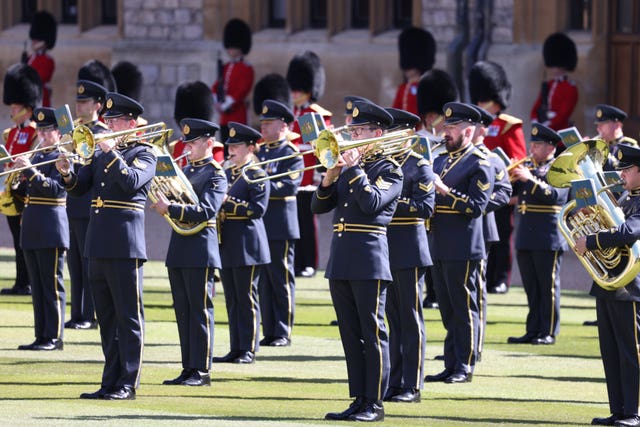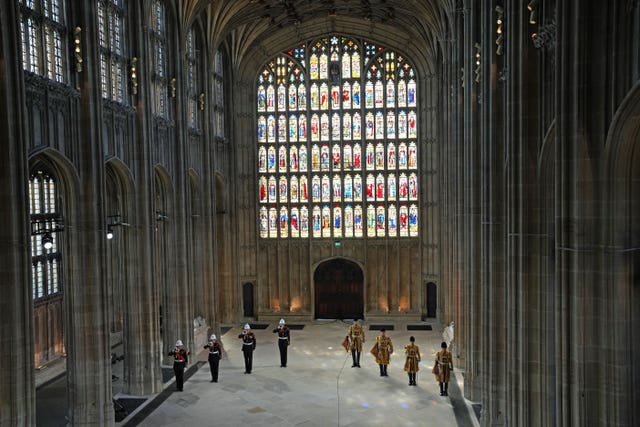Music chosen by duke provided personal soundtrack to funeral
Many of the arrangements had strong Naval and royal connotations.

Military bands and musicians, and a choir of just four, provided the very personal soundtrack to the Duke of Edinburgh’s funeral service.
The duke was said to be the guiding force behind many of the musical choices – played both before and during the service – and picked a wide range of music from Johann Sebastian Bach to Ralph Vaughan Williams.
Many of the arrangements had strong Naval and royal connotations, and were personally requested by Philip.
Ahead of Saturday’s service, armed forces musicians assembled in Windsor and played a range of music as they moved into position in the quadrangle in the grounds of Windsor Castle.

A tri-service band, comprising The Band of Her Majesty’s Royal Marines Commando Training Centre Royal Marines, The Band of the Scots Guards and The Combined Bands of the Royal Air Force, played as the duke’s Land Rover entered by the George IV gate ahead of the arrival of his coffin.
The music, said to have been chosen by Philip himself, included I Vow To Thee My Country, Supreme Sacrifice, Jerusalem, Isle Of Beauty and Nimrod.
Once the duke’s coffin had arrived at St George’s Chapel, a Royal Navy piping party, positioned on the south side of the west steps, piped the “Still” when the Land Rover was stationary, the “Side” ahead of the national minute’s silence and the “Carry On” after the coffin had entered the chapels and the doors closed.
The Rhosymedre by Williams, which was played before the service, has strong royal connotations and was featured at the weddings of the Duke and Duchess of Cambridge and the Duke and Duchess of Sussex, and also played at the funeral of Diana, Princess of Wales.
During the service, a choir consisting of Miriam Allan, Simon Whiteley, Tom Lilburn, and Nicholas Madden, sang hymns, including the well-known Victorian hymn Eternal Father, Strong To Save, which is strongly associated with the Navy in the UK.

Philip was closely associated with the Navy for more than 80 years, having enrolled at Britannia Royal Naval College in Dartmouth aged 17, he served at sea during the Second World War and later held numerous honorary ranks.
The funeral also featured two pieces of music the duke commissioned from celebrated composers.
The Jubilate in C was written by Benjamin Britten at the duke’s request around 1961 and has gone on to become a staple in cathedrals and churches across the country.
Funeral guests also heard the choir sing Psalm 104, which was set to music by guitarist and composer William Lovelady at Philip’s request.
Originally composed as a cantata in three movements, it was first sung in honour of the duke’s 75th birthday in 1996.
After the duke’s coffin was lowered into the royal vault, a Lament – Flowers of the Forest – was played by Pipe Major Colour Sergeant Peter Grant, from the Royal Regiment of Scotland.
The Last Post, which signals that a soldier has gone to his final resting place, was sounded by buglers of the Royal Marines and, after a period of silence, the Reveille was played by the State Trumpeters of the Household Cavalry.
This was followed by the buglers sounding ‘Action Stations’, as requested by the duke, which is played on a warship to signal all hands should go to battle stations and is sometimes featured at funerals of naval men.
The service closed with the choir singing the National Anthem and the royal family left the chapel to Bach’s Prelude and Fugue in C minor BWV 546.





